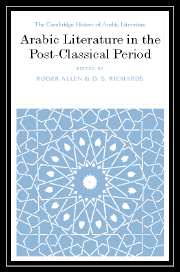Book contents
- Frontmatter
- The post-classical period: parameters and preliminaries
- Part I Elite Poetry
- Part II Elite prose
- 5 Pre-modern belletristic prose
- 6 The essay and debate (al-risāla and al-munāzara)
- 7 The maqāma
- 8 Mamluk history and historians
- 9 Historiography in arabic during the ottoman period
- Part III Popular poetry
- Part IV Popular prose
- Part V Drama
- Part VI Criticism
- Bibliography
- Index
- References
8 - Mamluk history and historians
from Part II - Elite prose
Published online by Cambridge University Press: 28 March 2008
- Frontmatter
- The post-classical period: parameters and preliminaries
- Part I Elite Poetry
- Part II Elite prose
- 5 Pre-modern belletristic prose
- 6 The essay and debate (al-risāla and al-munāzara)
- 7 The maqāma
- 8 Mamluk history and historians
- 9 Historiography in arabic during the ottoman period
- Part III Popular poetry
- Part IV Popular prose
- Part V Drama
- Part VI Criticism
- Bibliography
- Index
- References
Summary
The Mamluk sultan Qānsūh al-Ghūrī used to preside over twice-weekly soirées. Various topics were discussed, but history was a favourite area of debate. On one occasion at least they discussed al-Rawd al-zāhir, a life of Baybars written in the 1260s and 70s by Ibn ‘Abd al-Zāhir. Baybars’ foiling of a Mongol expedition against Mecca and the sultan’s investiture of an Abbasid caliph in Cairo were among the subjects debated by the sultan and his courtiers. Historical lore – tales of Alexander, Mahmūd of Ghazna, Timūr and Qāytbay – provided much of the conversation at the Mamluk court.
Earlier Mamluk sultans and amirs took an active interest in the production of chronicles. Ibn Abd al-Zāhir used to read al-Rawd al-zāhir to the sultan whose feats the book commemorated and, when completed, it was placed in the royal treasury. Similarly, over a century later, al-Aynī used to read to the Sultan Barsbay and the sultan would occasionally correct him on the details. The reading of history was also generally popular, as the profusion of surviving manuscripts testifies. There was an explosion of history-writing in the Mamluk period, though, of course, the writers and readers were not interested in just Mamluk history. A wholly fantastic (perhaps eleventh-century) history of pharaonic Egypt continued to be reproduced in the chronicles of sober historians such as al-Nuwayrī and al-Maqrīzī. Young mamlūks in training in the Cairo Citadel copied out histories of the Prophets. The alleged injustices of the Umayyad caliphs preoccupied historians, while others became obsessively interested in the Fatimids.
- Type
- Chapter
- Information
- Arabic Literature in the Post-Classical Period , pp. 159 - 170Publisher: Cambridge University PressPrint publication year: 2006
References
- 5
- Cited by



